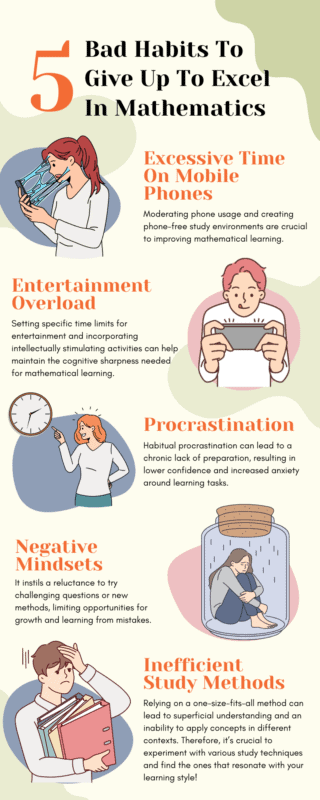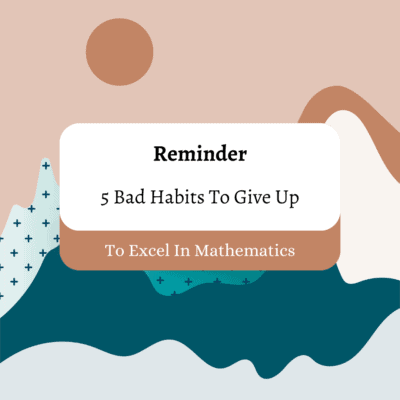Often viewed as a challenging subject, mathematics demands more than regular practice and hard work. It requires a strategic approach towards learning and lifestyle. Excelling in math isn’t solely about what you do; it’s also about what you don’t do! The journey to becoming proficient in mathematics involves shedding certain habits and distractions that can impede your ability to understand and apply mathematical concepts effectively. In this article, “5 Bad Habits to Give Up to Excel in Mathematics,” we delve into the various habits, distractions, and mindsets you need to let go of to pave the way for mathematical success.
1. Excessive Time on Mobile Phones
Excessive time spent on mobile phones can significantly hinder learning mathematics. These devices, with their endless stream of notifications and apps, create constant distractions that disrupt focus and fragment attention, making it challenging to engage deeply with complex mathematical concepts. The time consumed by phone use could be better spent on studying or practising math. Moreover, constantly checking phones can lead to reduced physical activity and social isolation, both detrimental to cognitive functions essential for learning, such as memory and problem-solving skills. Therefore, moderating phone usage and creating phone-free study environments are crucial to improving mathematical learning.
2. Entertainment Overload
Excessive indulgence in entertainment, such as prolonged TV watching and gaming often leads to time management issues, with crucial hours that could be spent on math studies being lost to screen time. Additionally, it contributes to a reduced attention span, essential for understanding complex mathematical concepts. Constant engagement in passive entertainment activities underutilizes critical thinking abilities and can disrupt sleep patterns, adversely affecting cognitive functions like memory and concentration that are vital for math proficiency. To counterbalance this, setting specific time limits for entertainment and incorporating intellectually stimulating activities can help maintain the cognitive sharpness needed for mathematical learning.
3. Procrastination
Procrastination notably hampers the learning process by creating a cycle of delayed study sessions, leading to insufficient practice and understanding. When we procrastinate, we compress our available study time, which increases stress and reduces the quality of learning. This rushed approach often leads to surface-level understanding rather than deep comprehension, as there’s insufficient time to thoroughly engage with and reflect on the learning material. Furthermore, habitual procrastination can lead to a chronic lack of preparation, resulting in lower confidence and increased anxiety around learning tasks. The cumulative effect of these factors is a diminished ability to grasp and retain math concepts effectively, impacting overall academic performance and knowledge acquisition.
4. Negative Mindsets
When individuals harbour a belief that they are inherently bad at math, it creates a self-fulfilling prophecy, where the expectation of failure leads to a lack of effort and engagement in learning. This mindset breeds anxiety and a defeatist attitude, making it difficult to approach mathematical problems with the necessary confidence and persistence. Fear of failure exacerbates this issue, as it instils a reluctance to try challenging questions or new methods, limiting opportunities for growth and learning from mistakes. Such an attitude not only hinders the acquisition of mathematical skills but also impacts overall intellectual growth, as it prevents individuals from stepping out of their comfort zone and embracing the learning opportunities that come with making and understanding errors.
5. Inefficient Study Methods
Wrong study methods can severely hinder progress in mathematics, as they often fail to align with individual learning styles and the unique challenges of the subject. Mathematics requires an approach that not only involves understanding theoretical concepts but also applying them through problem-solving. Rote memorization or passive reading, for instance, are less effective because they don’t engage the practical aspect of math. Each learner has a distinct style – visual learners may find visual aids like graphs and diagrams helpful, while others might benefit from hands-on approaches or group discussions. Relying on a one-size-fits-all method can lead to superficial understanding and an inability to apply concepts in different contexts. Therefore, it’s crucial to experiment with various study techniques and find the ones that resonate with your learning style!

In conclusion, excelling in mathematics goes beyond just the hours put into studying; it’s equally about letting go of certain detrimental habits. By addressing and rectifying these five key areas, learners can create a more conducive environment for mathematical success. Each of these habits, in its way, erects barriers to understanding and applying mathematical concepts effectively. Overcoming them requires conscious effort and self-awareness, but the rewards are substantial. By cultivating a positive, focused, and efficient approach to math learning, students can not only improve their proficiency in mathematics but also develop skills and habits that will benefit them in many other areas of their academic and professional lives! Remember, the journey to mastery in any field is as much about what you stop doing as it is about what you start doing 😊





